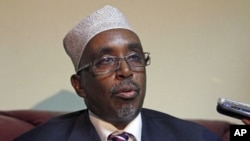With its mandate set to expire in less than four months, the Somali government has decided to postpone national elections until 2012.
On August 20, the original mandate bestowed to Somalia's transitional government by the international community will run out. The besieged government was given seven years to deliver a new constitution and national elections, but has thus far failed on both counts.
After a recent meeting, however, Somalia's Council of Ministers have announced it will deliver both by next year. Speaking to VOA, senior advisor to the Prime Minister Abdirahman Omar Osman said holding elections this year would be futile given the threat posed by Islamic insurgents al-Shabab.
"Most of south and central regions are controlled by al-Shabab who are not willing to take part of the said election," said Osman. "Therefore, it would be very difficult to get a kind of representative members of parliament that is accountable to its people."
Al-Shabab has been battling the government since 2007 to establish an Islamic state on the Horn of Africa. The group, which maintains ties to al-Qaida, has pushed the government to the edge of survival and controls the majority of central and southern Somalia, including much of the capital, Mogadishu.
The Transitional Federal Government (TFG) has maintained its foothold in Mogadishu with significant support from the 8,000 troops of the African Union peacekeeping mission AMISOM. Given al-Shabab's strength, many international observers see little hope for the beleaguered government.
But the TFG, using local forces trained by AMISOM troops, recently pushed out on the offensive, claiming victories in Mogadishu as well in the Gedo region along the Kenyan and Ethiopian border.
While the chance of victory over al-Shabab appears slim in the coming months, Osman says the government sees a momentum, which can be converted into victory by next year.
"If the current the developments of security continues the path on the way it is now then the government feels al Shabab will be defeated within 12 months and if that happens then the government will be in control of most of the country and elections can take place," added Osman.
But even if al-Shabab can be defeated, President Sheikh Sharif Sheikh Ahmed and Prime Minister Mohammed Abdullahi Mohammed are likely to face stiff opposition from within. Somalia's powerful speaker of parliament, Sharif Hassan Sheikh Aden, is engaged in a very public power struggle with the country's executive, and has been loath to support any initiative from the office of either man.
On February 3, Aden drew international criticism when the parliament voted to extend its term for an additional three years. While the speaker has defended the extension, he recently rejected a vote by the Council of Ministers to extend their own term by one year.
Several lawmakers have already rejected the delay in elections, and Aden reportedly snubbed a Saturday meeting to build consensus between the Parliament and the government.
Aden is said to be favored by regional powers such as Kenya and Ethiopia and has been pegged by many as a replacement for President Ahmed. If elections are held, the Aden would likely square off against Ahmed, who Osman indicated is interested in running.
Somalia has not had a functioning central government since the 1991 overthrow of dictator Mohammed Siad Barre in Mogadishu.




